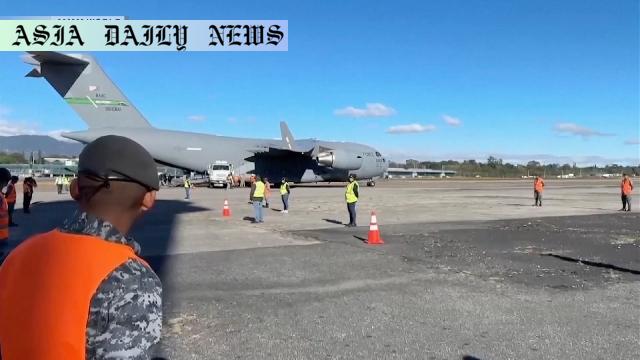Deportation: US initiates military-assisted deportation flights targeting undocumented immigrants to Guatemala.

Introduction: Deportation Efforts Intensified Under Trump Administration
The Trump administration has taken bold and controversial steps to curb illegal immigration into the United States. A recent initiative involves the deportation of undocumented immigrants with criminal records using military aircraft. The effort, targeting individuals from Guatemala, underlines the administration’s firm resolve to reinforce border security and take action against immigration violations. A senior defense official confirmed the operation, highlighting its scope and utilization of military resources.
Deployment of Military Aircraft for Deportation
On Thursday, the US government announced that hundreds of individuals categorized as “illegal immigrant criminals” were being deported to Guatemala using two military aircraft. This unprecedented use of military resources for deportation marks an aggressive stance on immigration enforcement, triggering widespread discussion on the ethical and logistical aspects of such measures.
Arrivals in Guatemala Confirmed
Guatemalan authorities confirmed the arrival of deportation flights on their soil. Reports suggest that these individuals were detained and processed before being flown to their country of origin. The Associated Press corroborated that military-transported deportations had indeed reached Central America, highlighting the scale of this operation.
Statements from the White House
In a bold declaration on social media, White House Press Secretary Karoline Leavitt reiterated the administration’s determination to counter illegal immigration. Her statement, accompanied by images of individuals boarding the flights, declared that the US would impose “severe consequences” for those entering the country unlawfully. The Trump administration aims to send a global message of zero tolerance towards illegal immigration.
Broader Immigration Policy
This operation aligns with the administration’s overall policy to strengthen border control. Alongside deploying additional troops to the US-Mexico border in January, these deportations are just one of many actions the Trump team has implemented since the inauguration. Emphasizing both enforcement and deterrence, these measures speak to one of the administration’s pivotal commitments in its governing agenda.
Implications for US-Guatemala Relations
The deportation may influence bilateral relations between the US and Guatemala. While the operation ostensibly aims to return individuals with prior criminal records, it could also place significant pressure on Guatemala’s infrastructure and legal systems to handle their reintegration. Human rights organizations may question whether such policies adequately safeguard the dignity and rights of deportees.
Controversy and Debate
The move has drawn criticism from immigrant advocates, legal experts, and various civil rights organizations. Critics argue that such tactics not only vilify immigrants but also blur the line between diplomacy and enforcement, creating both moral dilemmas and logistical challenges for deportee destination nations. Proponents, meanwhile, assert that these measures are necessary for national security and upholding immigration laws.
Amid heated debate, the deportations symbolize a turning point in US immigration policy, setting a precedent for future administrations to either build upon or dismantle. The narrative is far from over, and its long-term effects on migration and US relations with Central America remain to be seen.
Commentary
Beneath the Surface of Deportation Policies
The recent use of military aircraft to deport undocumented immigrants with criminal records signals a dramatic shift in immigration enforcement under the Trump administration. The operation articulates a strong, no-compromise stance on illegal immigration, yet it does raise important questions about the ethical and practical implications of such policies.
The Ethical Dilemma
The practice of deporting individuals en masse, particularly under the label of “illegal immigrant criminals,” is complex. On one hand, it meets legal and security demands. On the other, such measures risk oversimplifying an issue that often involves vulnerable populations seeking refuge or opportunity. Balancing national security with compassion remains a challenge for policymakers.
A Global Context
From a geopolitical perspective, these actions are inevitably felt beyond US borders. Guatemala, a country with its own social and economic challenges, must now manage a new influx of deportees under potentially strained systems. The global community may question whether this approach ultimately contributes to stability, or undermines it.
Looking Ahead
While the Trump administration remains steadfast in its agenda, the sustainability and transformative effect of such policies remain uncertain. Whether this will deter illegal immigration or fuel further criticism is a question only time can answer. Still, it is clear that immigration will continue to be a central and polarizing issue in American politics.


